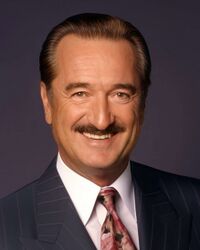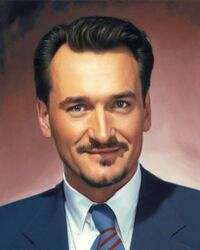Benedict Král
This article is incomplete because it is pending further input from participants, or it is a work-in-progress by one author. Please comment on this article's talk page to share your input, comments and questions. Note: To contribute to this article, you may need to seek help from the author(s) of this page. |
Benedict Král | |
|---|---|
 The official portrait of Benedict Král. | |
| 13th Primar of Ostrozava | |
| Assumed office 1 January 2021 | |
| Preceded by | Dominik Moravec (SSPT) |
| Parliamentary group | Union of Liberated Socialists (OSOS) |
| 23rd Subprimar of Orloşka | |
| In office 1 January 2016 – 31 December 2020 | |
| Preceded by | Branko Dobrovod (SSPT) |
| Succeeded by | Kotto Ebredeci (OSOS) |
| Parliamentary group | Union of Liberated Socialists (OSOS) |
| Constituency | Tardaňsk District |
| 48th MPC from Orloşka - Tardaňsk District | |
| In office 1 January 2010 – 31 December 2015 | |
| Preceded by | Denis Pekár (SSPT) |
| Succeeded by | Lýdia Botošová (OSOS) |
| Parliamentary group | Union of Liberated Socialists (OSOS) |
| Constituency | Tardaňsk District |
| Personal details | |
| Born | Benedict Marian Král 22 June 1964 Vandarek, Ardovia, Ostrozava |
| Political party | Union of Liberated Socialists (OSOS) |
| Height | 1.64 m (5 ft 5 in) |
| Alma mater | Institute for Republican Political Science |
Benedict Marian Král (born 22 June 1964), commonly known by his initials BMK, is the 13th and current Primar of Ostrozava. He previously served as the Subprimar of Orloşka from 2016 to 2021, and as a Member of the People's Congress (MPC) for the district of Tardaňsk from 2009 to 2016, debasing then-Facilitator Denis Pekár of the Progressive Party. Prior to his entrance into Prime Politics, Král spent two decades as a member of the Orloşkan Subprime Congress, where he became famous as a populist and grassroots-oriented politician, particularly in his early resistance to the Declaration of Neutrality of 1989.
Originally from Ardovia, Král studied classics and later recieved a Ph.D in Geopolitics at the Institute for Republican Political Science in Valegoria, graduating in 1987. He served as Chief Political Advisor for the National Arts Council under the first Sedláková administration, leaving over 'irreconcilable differences over neutrality' in 1989, at which point he moved to Orloşka and began seeking a career in local politics, first as the director of the Orloşkan Academics' Union, and then as part of the Orloşkan Subprime Congress's Tardaňsk District IV from 1991 to 2008, at which point he ran for the Prime Government, securing the MPC seat for the district of Tardaňsk in 2009. After several years as MPC for Tardaňsk, Král resigned to compete in the 2014 Orloşkan Election for Subprimar, winning in a landslide against Progressive incumbent Žigmund Koleno; Král's election put him on the map as the leader of the "Red Wave" across municipal and local elections taking place after Socialist Pushback to the Progressive handling of the 2005 outbreak of violence in Schaumberg and subsequent economic crisis in Ostrozava.
Early Life and career
Král was born on June 22, 1964, in the city of Vandarek, Ardovia. His mother, Alina Král, was a Professor of Organic Chemistry at the Ardovia Technical University's Vandarek campus, while his father, Olak Král, was a veteran of the Second Partisans' War and an economic analyst for both the Subprime Republic of Ardovia and the Prime Government with regards to cross-border trade with nearby Zamorodna. Král is an only child. When Král was 7 years old, his family moved to Valegoria for two years, and then to the capital of Orloşka, Orlorec, where he finished high school. He has been described as a "class clown" and "brilliant but uninterested student" by his former classmates and teachers. On more than one occasion, Král intentionally failed exams to aggravate his parents, which brought him the ire of the school's headmaster. He was a writer for the school newspaper and dabbled in football and Pitz.
After graduating high school in 1982, Král enrolled at the Institute for Republican Political Science in Valegoria to pursue his studies in classics. It was during this time that he developed an interest in politics and geopolitics, which would ultimately shape his future career path. After completing his undergraduate studies, Král stayed on at the Institute to pursue a Ph.D. in Geopolitics, finishing in 1987. During this time, Král was held overnight twice by Valegoria Municipal Police for public intoxication, which went on to garner controversy in his subsequent political career. While finishing his studies, Král also served as an editor for Tribuna Populară, then Valegoria's second most circulated newspaper, which required him to learn Valdavian to a conversational level. Král served as a part-time Civil Guardsman from 1985 to 1988 in order to garner enough service credits to enter politics.
Political career
After graduating, Král refrained from joining any political party, but did join several adjacent activist groups, including the League for Transkarminian Environmental Justice (LpJET), the Valegoria Beranist Alcove, and the Anti-Totalist Front. For a brief time between February and October of 1989, Král was recruited by the Sedláková administration as the Chief Political Advisor for the newly-established National Arts Council. His job largely consisted of advising the Council on the political implications of art, including its preservation. Despite a successful first project that revitalized the ex-Transkarminian Summer Palace in Valegoria by converting it into the Oskar Beranek National Theatre, Král resigned after a public spat that made headlines in Valegoria, when his proposal for the removal of all statues of Alek Dalibor was struck down on the grounds of "historical preservation". Král was vocal about the removal of the statues to the point of resignation, at one point recommending that if the statues could not be removed, they should instead be converted into shooting range targets for the public or Civil Guard. The stunt did little to help his political career in the Progressive-dominated Sedláková era, and also brought the ire of many more traditionalist Socialists who recommended a partial rehabilitation of Dalibor's image. However, Král's firebrand attitude nevertheless gained him supporters among OSOS's youth and reformist wing.
Local congressman for Tardansk (1991-2010)
Král moved from Valegoria to Orloşka after his resignation from the NAC in late 1989, and spent a year reinvigorating his academic career. He helped the University of Tardansk establish one of the first bibliographic databases in Ostrozava, but became disillusioned with the slow pace of academic life and decided to return to politics in an elected capacity around 1990; he also joined the Socialist party in May of 1990 after some initital deliberation as to whether to run as an independent in local elections. Dissuaded from doing so by the difficult election records that non-Compact parties had held even in local elections since the late 1980s, Král ran as the Socialist candidate for Tardansk District IV in 1991 for the Orloşkan Congress, securing the seat after a virtually uncontested election fight. Král would go on to remain in this position for almost two decades.
